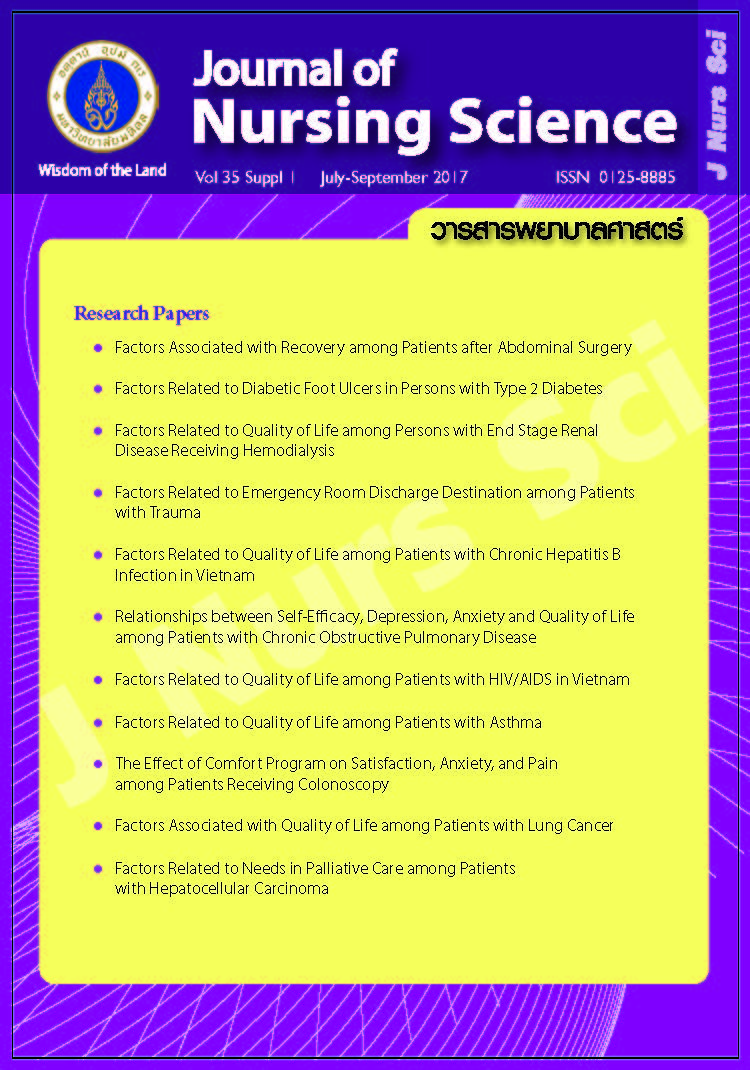Factors Related to Quality of Life among Patients with HIV/AIDS in Vietnam ปัจจัยที่มีความสัมพันธ์กับคุณภาพชีวิตในผู้ป่วยที่ติดเชื้อ เอช ไอ วี /เอดส์ในเวียดนาม
Main Article Content
Abstract
Purpose: To determine the relationships among education level, medication adherence, social support, and quality of life in patients with HIV/AIDS in Vietnam.
Design: Descriptive correlational design.
Methods: Sample was 115 HIV/AIDS patients at outpatient center in Bach Mai Hospital, Hanoi, Vietnam. Data were collected using questionnaires: WHOQOL-HIV BREF, Medication Adherence scales, and the Multi-dimensional Scale of Perceived Social Support (MSPSS). Spearman’s rho was employed to examine the relationships among studied variables.
Main findings: The findings showed that there was a positive correlation between social support and overall score of QOL (rs = .38, p < .05).
Conclusions and recommendations: The results imply that perceive social support from different sources are very important to promote quality of life. So, nurses should provide counseling to caregivers, family members, and friends to support patients with HIV/AIDS both physical and psychological aspects.
บทคัดย่อ
วัตถุประสงค์: เพื่อศึกษาความสัมพันธ์ระหว่าง ระดับการศึกษา ความสม่ำเสมอในการรับประทานยา การสนับสนุนทางสังคม และคุณภาพชีวิตในผู้ป่วยที่ติดเชื้อ เอช ไอ วี /เอดส์ในเวียดนาม
รูปแบบการวิจัย: การศึกษาเชิงสหสัมพันธ์
วิธีการดำเนินการวิจัย: กลุ่มตัวอย่าง คือ ผู้ป่วยที่ติดเชื้อ เอช ไอ วี /เอดส์ ที่มารับการรักษาที่ตึกผู้นอก โรงพยาบาลบาคมาย เมืองฮานอย ประเทศเวียดนาม จำนวน 115 ราย เก็บรวบรวมโดยใช้แบบสอบถามคุณภาพชีวิต (WHOQOL-HIV BREF) ความสม่ำเสมอในการรับประทานยา และการรับรู้สนับสนุนทางสังคม (MSPSS) วิเคราะห์ข้อมูลทั่วไป โดยใช้สถิติเชิงบรรยายและวิเคราะห์ความสัมพันธ์ โดยใช้สถิติ Spearman’s rho
ผลการศึกษา: การรับรู้การสนับสนุนทางสังคมมีความสัมพันธ์ทางบวกกับคุณภาพชีวิตของผู้ป่วยที่ติดเชื้อ เอช ไอ วี /เอดส์อย่างมีนัยสำคัญทางสถิติ (rs = .38, p < .05)
สรุปและข้อเสนอแนะ: การรับรู้การสนับสนุนทางสังคมจากแหล่งต่างๆ มีความสำคัญมากในการส่งเสริมคุณภาพชีวิต พยาบาลควรให้คำปรึกษาแก่ผู้ดูแล สมาชิกในครอบครัวและกลุ่มเพื่อน เพื่อสนับสนุนผู้ป่วยที่ติดเชื้อ เอช ไอ วี /เอดส์ทั้งด้านร่างกายและจิตใจ
Article Details
Copyright Notice: Nursing Science Journal of Thailand has exclusive rights to publish and distribute the manuscript and all contents therein. Without the journal’s permission, the dissemination of the manuscript in another journal or online, and the reproduction of the manuscript for non-educational purpose are prohibited.

Disclaimer: The opinion expressed and figures provided in this journal, NSJT, are the sole responsibility of the authors. The editorial board bears no responsibility in this regard.
References
2. UNAIDS. Global report: UNAIDS report on the global AIDS epidemic 2010 [Internet]. Geneva, Switzerland: UNAIDS; 2010 [cited 2017 Jan 15]. Available from: http://www.unaids.org/sites/default/files/media_asset/20101123_globalreport_en_1.pdf.
3. WHO, UNAIDS, UNICEF. Global HIV/AIDS response: epidemic update and health sector progress towards universal access: progress report 2011 [Internet]. Geneva, Switzerland: World Health Organization; 2011 [cited 2017 Jan 15]. Available from: http://whqlibdoc.who.int/publications/2011/9789241502986_eng.pdf.
4. Joint United Nations Program on HIV/AIDS. Report on the global AIDS epidemic [Internet]. Geneva, Switzerland: Joint United Nations Program on HIV/AIDS, UNAIDS; 2008 [cited 2017 Jan 15]. Available from: http://www.unaids.org/en/KnowledgeCentre/HIVData/GlobalReport/2008/2008_Global_report.asp
5. Ministry of Health (Vietnam). Health statistics yearbook. Ha Noi City: Ministry of Health (Vietnam); 2006.
6. Degroote S, Vogelaers D, Vandijck DM. What determines health-related quality of life among people living with HIV: an updated review of the literature. Arch Public Health. 2014;72(1):40.
7. Hays RD, Cunningham WE, Sherbourne CD, Wilson IB, Wu AW, Cleary PD, et al. Health-related quality of life in patients with human immunodeficiency virus infection in the United States: results from the HIV cost and services utilization study. Am J Med. 2000;108(9):714-22.
8. Murri R, Fantoni M, Del Borgo C, Visona R, Barracco A, Zambelli A, et al. Determinants of health-related quality of life in HIV-infected patients. AIDS Care. 2003;15(4):581-90.
9. Geocze L, Mucci S, De Marco MA, Nogueira-Martins LA, Citero Vde A. Quality of life and adherence to HAART in HIV-infected patients. Rev Saude Publica. 2010;44(4):743-9.
10. Corless IB, Voss J, Guarino AJ, Wantland D, Holzemer W, Jane Hamilton M, et al. The impact of stressful life events, symptom status and adherence concerns on quality of life in people living with HIV. J Assoc Nurses AIDS Care. 2013;24(6):478-90.
11. P Ruiz Perez I, Rodriguez Baño J, Lopez Ruz MA, del Arco Jimenez A, Causse Prados M, Pasquau Liaño J, et al. Health-related quality of life of patients with HIV: impact of sociodemographic clinical andpsychosocial factors. Qual Life Res. 2005;14(5):1301-10.
12. Weiss R. The provision of social relationships. Englewood Cliffs, New Jersey: Prentice Hall; 1974.
13. Burgoyne R, Renwick R. Social support and quality of life over time among adults living with HIV in the HAART era. Soc Sci Med. 2004;58(7):1353-66.
14. Faul F, Erdfelder E, Buchner A, Lang AG. Statistical power analyses using G*Power 3.1: tests for correlation and regression analyses. Behav Res Methods. 2009;41(4):1149-60.
15. Zimet GD, Dahlem NW, Zimet SG, Farley GK. The multidimensional scale of perceived social support. J Pers Assess. 1988;52(1):30-41.
16. WHOQOL HIV Group. WHOQOL-HIV for quality of life assessment among people living with HIV and AIDS: results from the field test. AIDS Care. 2004;16(7):882-9.
17. Wewers ME, Lowe NK. A critical review of visual analogue scales in the measurement of clinical phenomena. Res Nurs. Health 1990;13(4):227-36.
18. O'Connell KA, Skevington SM. An international quality of life instrument to assess wellbeing in adults who are HIV-positive: a short form of the WHOQOL-HIV (31 items). AIDS Behav. 2012;16(2):452-60.
19. Tran BX, Ohinmaa A, Nguyen LT, Oosterhoff P, Vu PX, Vu TV, et al. Gender differences in quality of life outcomes of HIV/AIDS treatment in the latent feminization of HIV epidemics in Viet Nam. AIDS Care. 2012;24(10):1187-96. doi: 10.1080/09540121.2012.658752.
20. Tran BX, Ohinmaa A, Nguyen LT, Nguyen TA, Nguyen TH. Determinants of health-related quality of life in adults living with HIV in Viet Nam. AIDS care. 2011;23(10):1236-45.
21. Tran BX, Nguyen LT, Nguyen NH, Hoang QV, Hwang J. Determinants of antiretroviral treatment adherence among HIV/AIDS patients: a multisite study. Glob Health Action. 2013;6:19570. doi: 10.3402/gha.v6i0.19570.
22. Mahalakshmy T, Premarajan K, Hamide A. Quality of life and its determinants in people living with human immunodeficiency virus infection in puducherry, India. Indian J Community Med. 2011;36(3):203-7.
23. Van Tam V, Larsson M, Pharris A, Diedrichs B, Nguyen HP, Nguyen CT, et al. Peer support and improved quality of life among persons living with HIV on antiretroviral treatment: a randomised controlled trial from north-eastern Viet Nam. Health Qual Life Outcomes. 2012;10:53. doi: 10.1186/1477-7525-10-53.


